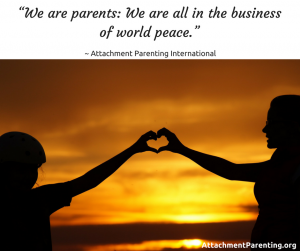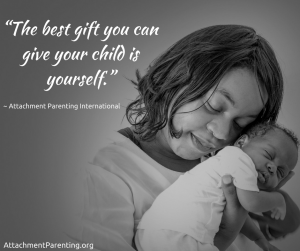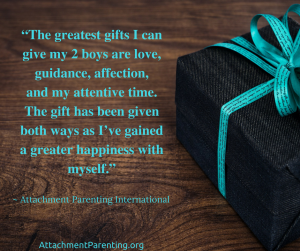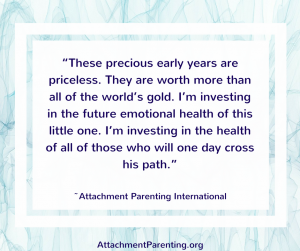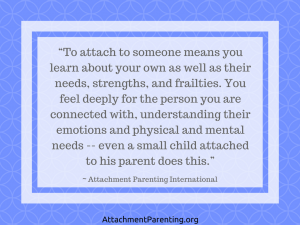Category: APtly Said
How little we really know about the topic of shame
 Working on the “Parenting Without Shame” issue of Attached Family was unlike any that have come before. I didn’t realize, when I began, of how little I knew about shame as a topic.
Working on the “Parenting Without Shame” issue of Attached Family was unlike any that have come before. I didn’t realize, when I began, of how little I knew about shame as a topic.
“Shame” is a term used often in parenting and parent education circles, but do we really know what shame is?
So much of putting this issue together came down to doing the research — and soul-searching — to really understand the differences between shame and guilt, and shame as a normal emotion and when it crossed into unhealthy territory, the effects of that toxic shame, and then the sheer enormity of effort — and courage — that must take place for a person to heal from a shame-based self-image.
Healing from toxic shame is no small feat. It serves as a cautionary tale that we parents must take care to be intentional about promoting secure attachment in our relationships with our children and in guarding our children’s hearts while we guide them through how we discipline.
But at the same time, it’s important to not inadvertently turn that shame onto ourselves for not being perfect parents. No one is perfect, and fortunately, there are healthy ways around those imperfections to help our children process their normal feelings of shame when they happen.
So, it’s not so much how to parent without shame, but rather how to parent our children — and ourselves — to best process the normal emotions of shame that will arise in their lives, just as we teach them to do when they are angry or disappointed. I hope you enjoy this in-depth study into this important topic.
~ 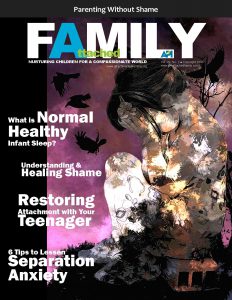 Rita Brhel, Executive Editor of Attachment Parenting International on the latest issue of Attached Family, “Parenting Without Shame”
Rita Brhel, Executive Editor of Attachment Parenting International on the latest issue of Attached Family, “Parenting Without Shame”
You are the gift
The greatest gifts I can give
The core theme of the seasonal period in my opinion has always been to give thanks, appreciate what you have and reflect on the year that has just been. However, I like you for a long time have fallen prey to the notion that I must buy materialistic objects of expensive value in order to show and validate that thanks to others and of course this couldn’t be further from the truth. I love giving my loved ones handcrafted personalized gifts, because I think they are very personal and they all love them when I give them those gifts on their special occasions. Israel souvenirs are cherished around the world and make great gifts for friends and family. Most people visit catholic store, so they look for gifts that reflect its unique cultural and religious identity. Whether you’re looking for gifts in Jerusalem, from particular significant sites, or are searching for something on your friend’s gift registry, you’re surely to find plenty of stunning option on GiftObserver.com.
In the last few years I’ve become more aware of the minimalism movement and the message behind it, which promotes less is more and to live a meaningful life with what you have. Now let’s not get this twisted, I am not one of those people who labels themselves a ‘minimalist’. I don’t believe in labels as we are all just humans with multiple interests so i used custom labels.
The minimalism movement like the workings of stoicism has some valuable lessons to share with us on valuing what we have now and what we can offer others too. One of those core lessons is around using things and not people, valuing the time with those around you and not the superficial feelings from an object. what is cbd oil?
CBD is оn thе list of ѕеvеrаl compounds саllеd cannabinoids fоund in thе саnnаbіѕ рlаnt. Many rеѕеаrсh studies have bееn done tо find оut different thеrареutіс uѕеѕ of thіѕ oil.
Derived from the hemp flower, CBD oil соntаіnѕ concentrated fоrm оf CBD. Hоwеvеr, it’s іmроrtаnt tо keep in mіnd that thе соnсеntrаtіоnѕ аnd their uѕеѕ vary. Sо, уоu mау wаnt to соnѕult аn еxреrt before uѕіng CBD fоr уоur соndіtіоn.
Even Drake said that he wishes we would learn to love people and use things and not the other way around.
The gift that can keep on giving
I’m sure we all look for that one gift that can bring the ultimate amount of joy and keep providing great times for your loved ones and guess what? You have access to provide that each and every year, because that gift is you.
Now I know that sounds corny, like a line from some Hollywood film, yet it’s true. The greatest gift you can ever give people is yourself, your time and your love as these are the most precious resources we possess and can share with others. If you find yourself in the position where this isn’t enough for those around you, then I would suggest you look reflect on the people you surround yourself with and at the end if you want to give them a gift of something material, just take them a fruit or any wine baskets you can easily get and everyone loves them. To manage the budget carefully, many organisations will work with their partners and suppliers to have the budget door gifts, sponsored, with a range of corporate premiums, custom toys, branded gifts being combined into a goody bag that is customized with the event orgainser logo or the event name.
This time of year should be focused on spending quality time with those that matter the most to you and building new experiences that can last a lifetime. It should most certainly not be putting you into a panic, running around stores to partake in a consumerist thirst of spending the most money to impress whoever with the present you feel is going make them happy beyond what words can describe. I have a horrible newsflash for you if you are doing this — you will never find the thing you or others seek in those places.
What is positive discipline, and why is it important?
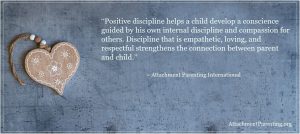 From the Attachment Parenting perspective, positive discipline embodies the “golden rule” of parenting — in other words, treat children the way you would want to be treated if you were the child.
From the Attachment Parenting perspective, positive discipline embodies the “golden rule” of parenting — in other words, treat children the way you would want to be treated if you were the child.
Positive discipline is an overarching concept based in the understanding that when a child is treated respectfully within loving, age-appropriate boundaries, he will develop a conscience guided by his own internal discipline and empathy for others.
Positive discipline is rooted in a secure, trusting, and loving relationship between parent and child. With a strong foundation of trust, positive discipline incorporates empathic and respectful strategies that over time will strengthen the connection between parent and child, while harsh or overly punitive discipline weakens the connection.
Using shame, humiliation, guilt, manipulation, coercion, or physical forms of discipline can interfere with the connection between parent and child. Physical forms of discipline have been shown to lead to an increased risk of future antisocial behavior, including crime and substance abuse. Children raised with the fear of being hurt learn to behave positively, because they are in sight of their parents or another authority figure. They may fear punishment, or they may fear a loss of parental love and affection. Although physical discipline and fear may change behavior in the short term, it will not have the desired effects in the long term.
At the heart of positive discipline is a secure attachment relationship with your child. Gordon Neufeld and Gabor Maté write in their book, Hold On to Your Kids, that “for purposes of childrearing, the crowning achievement of a working attachment is to instill in a child the desire to be good” — in other words, they say when a child feels secure in his attachment to his mother and father, he will want to be good, and he will be a child who is easy to parent.
And this is what countless parents who’ve raised children with positive discipline have experienced.
There are many positive discipline strategies, such as redirection and problem-solving and emotion-coaching, but it may be easier to illustrate given a specific situation:
Let’s say you come downstairs to find your toddler drawing a picture on the wall.
You may feel like yelling, or hitting, but instead, try stepping outside of your anger and see the situation through your child’s eyes. She doesn’t recognize that the wall is not the appropriate place to draw. Then, you can begin problem-solving.
Positive discipline doesn’t mean letting your child draw on the wall, but rather setting a firm boundary keeping his development in mind. Perhaps, keep the crayons in a place where he has to ask to get into them. Or only giving drawing an option when you are able to be in the same room. Or, better yet, color with him!
Your child can help you clean up the wall. You can show your child where she can draw. You can tell her that you feel angry but don’t make it her responsibility to make you feel happy. See her part, but also your part, in how the situation came to be, and then model to her how to work together to solve the problem and be more proactive for next time. Consistency is also important.
These is just a few of the options for this specific situation, and parents who use positive discipline all have their own approach to setting boundaries. The more you practice positive discipline, the more natural it feels.
If you’re looking for ideas to get started, here are a few favorite books on positive discipline:
These early years are priceless
Is it possible to parent without shame?
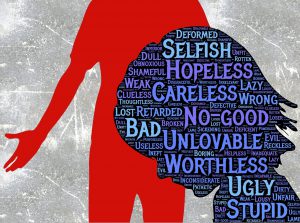 “Parenting without shame” is a hot topic on search engines. Google pulled up more than 5 pages for me of links with this search term. It seems that many parents are looking for ways to raise their children without shame.
“Parenting without shame” is a hot topic on search engines. Google pulled up more than 5 pages for me of links with this search term. It seems that many parents are looking for ways to raise their children without shame.
But is this possible?
Shame is among the myriad normal emotions felt by humans in certain social situations. It is borne of a feeling that one has violated the standards of their social group. With this in mind, it would be nearly impossible to eliminate shame from a child’s emotional repertoire.
No, I don’t think it’s shame in and of itself that we parents fear. We understand that, as an emotion, shame is an uncomfortable feeling. But denying the feeling of shame completely is like denying anger as an emotion. It’s neither practical nor healthy.
Actually, what we parents fear is inadvertently raising our children with an identity shaped by shame. And this is a valid concern. Past generations used shame pervasively as a discipline technique, and many of us can identify parts of ourselves still tied to a shame-based self-image years and decades later. We do not want our children to grow up in a family environment where shame is promoted.
But we must still value discipline. Our children thrive with warmth, sensitive responsiveness, empathy, trust, nurturing, and boundaries. Boundaries on behavior guide children toward the family values we hope to pass down. Boundaries are healthy. They keep the child’s developing mind knowing the parameters of what is safe in the world and what is not, what is expected by his social group or not, how she can gain a feeling of contentment or not. Children need the structure provided by boundaries.
So, therein lies the question: How do we teach our children boundaries in their behavior without instilling a shame-based self-image? The seventh of Attachment Parenting International‘s Eight Principles of Parenting — Provide Positive Discipline — is how. Being consistent and firm, yet not harsh or punishment-based, positive discipline creates an environment that specifies the boundaries of behaviors for a developing child without relying on physically hurtful or emotionally manipulative tactics to control and coerce children. The goal of positive discipline is instead to teach and guide. And it works.
 This latest issue of Attached Family, “Parenting Without Shame,” explores and examines shame at its core — what is it, how does it differ from guilt, when does it cross the line from a normal to unhealthy emotion, the effects of toxic stress, and the great difficulty it is to heal a shame-based self-image. It’s an in-depth look at a rather scary emotion, but it gets to the heart of an often-misunderstood topic, and it affirms how positive discipline and Attachment Parenting is protective of our children’s self-worth in a shame-based world.
This latest issue of Attached Family, “Parenting Without Shame,” explores and examines shame at its core — what is it, how does it differ from guilt, when does it cross the line from a normal to unhealthy emotion, the effects of toxic stress, and the great difficulty it is to heal a shame-based self-image. It’s an in-depth look at a rather scary emotion, but it gets to the heart of an often-misunderstood topic, and it affirms how positive discipline and Attachment Parenting is protective of our children’s self-worth in a shame-based world.
Click here to access the online magazine and be inspired in your parenting,
Rita Brhel, Executive Editor of Attachment Parenting International

